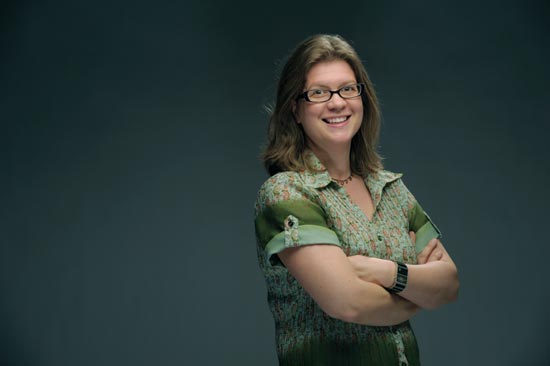Cognitive neuroscientist Isabel Gauthier enjoys the process of discovery

Long pegged as one of the premier experts in the science of face recognition, Isabel Gauthier’s research has much broader implications – including how our brains work, how we learn, and finding ways to make life better for people with autism.
“No part of the brain works in isolation. It really is a complex process and fairly flexible,” said Gauthier, professor of psychology in the Cognition and Cognitive Neuroscience program at Vanderbilt. “[rquote]People change, so clearly their brain is going to change. What I’m really interested in is how the dynamics of the changes in the brain allow for the dynamics of the changes in behavior.[/rquote]”
Gauthier and her team, based in Wilson Hall, spend many hours at the Vanderbilt University Institute of Imaging Science in Medical Center North. Using fMRI (functional Magnetic Resonance Imaging), they map brain activity. Test subjects volunteer to go into the scanner (much like a regular MRI) and must lie very still while being shown various stimuli, including objects, photographs or even musical notation. When their brain recognizes something they have seen previously, “hot spots” show up, identifying what part of the brain is being used.
Among the more striking experiments are those involving face recognition.
“There has been a lot written about face recognition and how it is different from everything else we recognize with our visual system,” Gauthier said. “But our work has been motivated by testing the possibility that maybe faces are only special because it’s a case of expertise.
“What I mean is that we begin learning about faces very early in our lives, and we practice face recognition so much that our brains get really good at solving that particular ‘problem.’ By gaining expertise, it changes our brain in the process.”
Understanding expertise
In recent studies, Gauthier has moved from identifying recognition hot spots to deciphering if the participant’s brain recognizes a face or object as a whole or only notices certain visual cues.
“We say that people perceive a face ‘holistically’ when they are able to recognize a face based on more than one attribute at a time, rather than, say, just the eyes,” she said. “We were able to show that people vary considerably in the extent to which they process faces holistically, and that those people who treat faces this way are the best face recognizers.”
Gauthier has determined that visual information about objects – whether it’s identifying models of cars or novel objects (called “greebles” in psychology circles) – can be processed holistically too.
“When we teach people to become experts with these novel objects, the more holistically they perceive them, the more the ‘face-selective’ parts of their brain become active,” Gauthier explained.
“Perhaps most surprising, a car expert who is perceiving cars holistically cannot at the same time use this strategy with faces. This has taught us that even though perceptual skills can change with experience, they are nonetheless a limited resource in the brain.”
This phenomenon may be significant in the study of how children learn, particularly because they often simultaneously develop many types of perceptual expertise while in school.
“It may be important to understand under what circumstances these skills compete with one another,” she said.
Solving problems
Gautier, a self-described “process person” enjoys the daily problem solving that comes with her job.
“I like science – all the little decisions,” she said. “You have to come up with a good question and find the next piece of the puzzle. I never find it boring.
“We’re not curing cancer, but each day we are figuring out a little more how the brain works, and there are many applications for that.”
One of those applications is in the field of autism.
“We studied a boy who had autism and who was an expert on these animated Digimon characters. For human faces, he had no recognition, but for the characters he did. This has motivated some of my colleagues to ask, ‘Can we motivate people with autism through video games to learn faces? If we overcome one challenge, such as the lack of interest in making eye contact, will that help resolve other social issues that people with autism face?’”
Over the past decade, Gauthier has found it satisfying to share her love of science with the graduate students in her care.
“I’ve really become motivated more and more to train grad students,” she said. “I think sometimes I forget we’re doing science and I just want to hear from the students – what they’re excited about, what progress they’ve made, to see them grow. Because I’m a process person, each of these sorts of challenges presents something interesting to me.”
Gauthier came to Vanderbilt with her husband René Marois, also a cognitive neuroscience researcher at Vanderbilt and fellow French Canadian from Quebec, after earning graduate degrees at Yale in 1998.